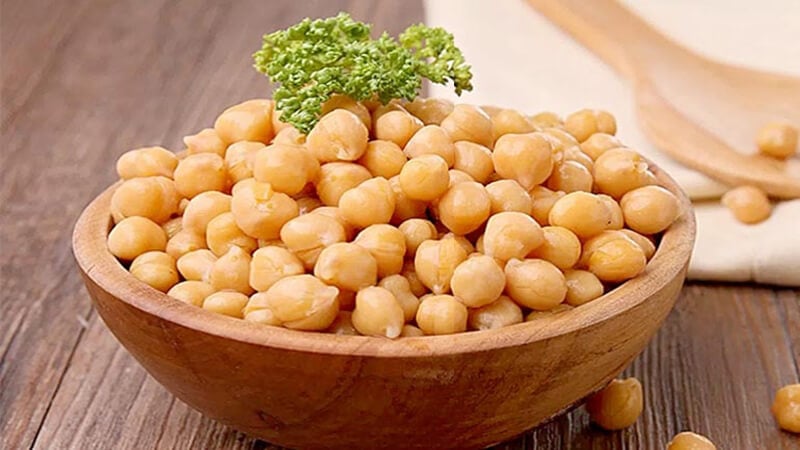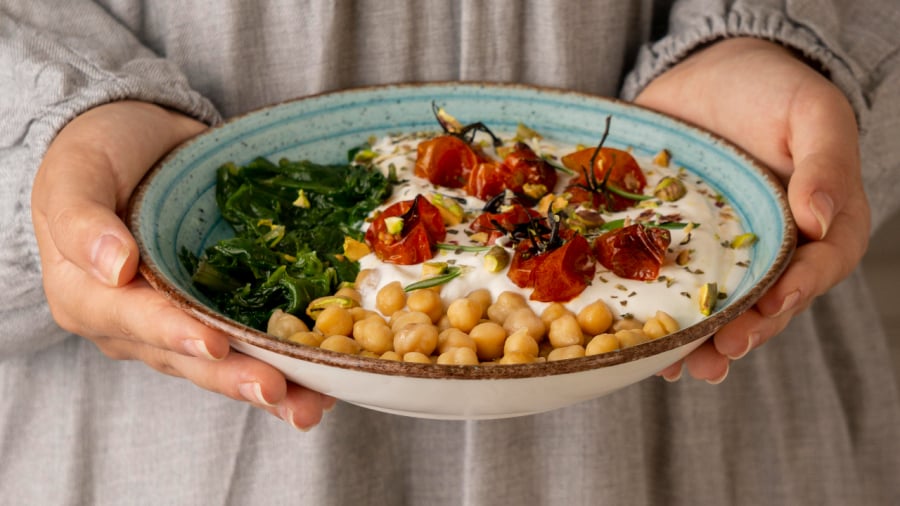Chickpeas: A Nutritional Powerhouse with Remarkable Health Benefits
Chickpeas, a legume originating from the Middle East, are renowned for their multifaceted nutritional profile. Brimming with vitamins, minerals, and fiber, these versatile legumes offer an array of health benefits. They are a staple in weight loss diets, aid in digestive health, and protect against chronic diseases. Additionally, their high protein content makes them an effective plant-based substitute in vegan dishes.
Easily accessible in various markets, chickpeas can be incorporated into a wide range of culinary creations, from creamy hummus and hearty soups to salads and stir-fries. Their bold flavor and larger size compared to lentils or black beans make them a nutritious choice with a moderate calorie count. A one-cup serving of chickpeas (164g) contains approximately 269 calories and provides an impressive 74% of the recommended daily intake of manganese, along with a wealth of vitamin B9, copper, iron, zinc, and more. Scientific research has confirmed the following health benefits attributed to chickpeas:
Weight Management
Chickpeas are an excellent source of protein and fiber, both of which contribute to satiety, reducing overall food intake and calorie consumption. A one-cup serving of chickpeas (164g) provides 14.5g of protein, a macronutrient essential for weight management, as well as bone and muscle health. Studies indicate that regular consumption of chickpeas is associated with lower body mass index (BMI) and waist circumference, compared to individuals who do not include this legume in their diet.

Chickpeas are an excellent source of protein and fiber, both of which contribute to satiety.
Glycemic Control
With a glycemic index (GI) of only 15, chickpeas fall into the low-GI food category, helping to prevent undesirable blood sugar spikes after meals. The fiber and protein in chickpeas gradually slow down the digestion of carbohydrates, maintaining stable blood glucose levels. Furthermore, nutrients like magnesium, B vitamins, and zinc play a supportive role in mitigating the risk of developing type 2 diabetes.
A small study spanning 12 weeks demonstrated that individuals consuming 300g of chickpeas weekly experienced a significant reduction in fasting insulin levels, a key indicator of blood sugar control. Additional research suggests that chickpeas may reduce the risk of developing several conditions, including diabetes and cardiovascular diseases.
Improved Digestion
The soluble fiber in chickpeas promotes the growth of beneficial bacteria in the gut, while inhibiting the proliferation of harmful bacteria that can contribute to digestive issues such as irritable bowel syndrome (IBS) and colon cancer. Additionally, chickpeas are known to enhance bowel movements, further supporting digestive health.

The soluble fiber in chickpeas promotes the growth of beneficial bacteria in the gut.
Heart Health
Chickpeas are a rich source of essential minerals such as magnesium and potassium, which play a vital role in controlling blood pressure and protecting the heart. Soluble fiber from chickpeas has been shown to reduce levels of triglycerides and LDL cholesterol, often referred to as “bad” cholesterol. Based on findings from 26 studies, consuming at least one serving of legumes per day, including chickpeas, can effectively lower LDL cholesterol levels.
Rich in Iron, Supporting the Circulatory System
According to the United States Department of Agriculture (USDA), per 100g of chickpeas contains approximately 4-6.2mg of iron, an essential element in the production of red blood cells and the delivery of oxygen throughout the body. Iron also aids in energy levels, brain development, and muscle function. Iron deficiency can lead to symptoms such as fatigue, weakness, and shortness of breath. Chickpeas are also rich in vitamin C, which enhances the absorption of iron, contributing to the overall health of the circulatory system.

Per 100g of chickpeas contains approximately 4-6.2mg of iron.
Enhanced Brain Function
Essential nutrients found in chickpeas, such as choline, magnesium, selenium, and zinc, are crucial for brain function, alleviating symptoms of depression and anxiety.
Considerations for Consuming Chickpeas
Chickpeas are generally considered a safe food; however, some individuals may have an allergic reaction. Therefore, it is advisable to start with a small amount to observe your body’s response. Chickpeas should be cooked before consumption to eliminate toxins and prevent discomfort. Furthermore, it is recommended to limit daily chickpea intake to 70g to minimize potential issues such as gas and nausea.































